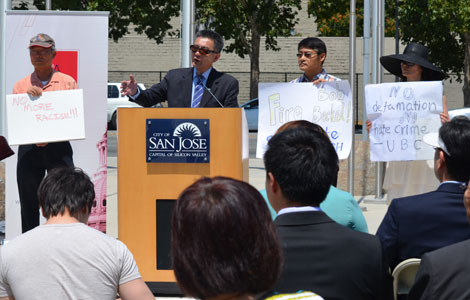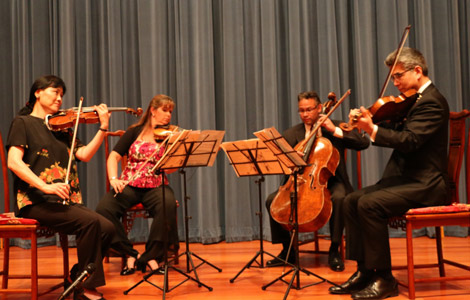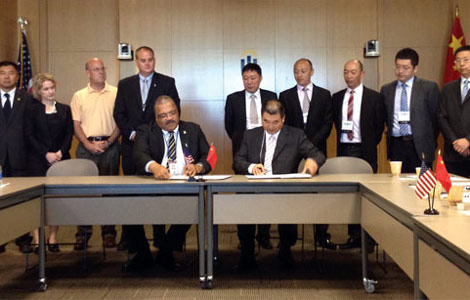Xi: World big enough for two great nations
Updated: 2014-07-10 07:21
By LI XIAOKUN, ZHANG YUNBI in Beijing and CHEN WEIHUA in Washington (China Daily USA)
|
||||||||
Beginning a new round of high-level talks, Beijing and Washington vowed on Wednesday they would not allow areas of disagreement to overshadow their relationship, which is critical to global prosperity.
Both countries expressed confidence that careful management of any differences would prevent escalating tension and that healthy competition, not confrontation, was the way forward. Observers said the dialogue would serve as a "disinfectant" to help cleanse wounds inflicted in a series of disputes.
"A China-US confrontation, for the two countries and the world, would definitely be a disaster," President Xi Jinping said at the opening ceremony of the sixth round of the Strategic and Economic Dialogue (S&ED) at the Diaoyutai State Guesthouse.
That venue is where former US Secretary of State Henry Kissinger carried out secret talks in the 1970s that paved the way to establishing bilateral relations.
"The vast Pacific Ocean has ample space to accommodate our two great nations," Xi said.
Relations between Beijing and Washington have recently been soured over Washington's comments on issues such as maritime territorial tensions, allegations of the Chinese military engaging in cyber theft and a protest in Hong Kong.
Christopher Johnson, senior advisor and Freeman Chair in China Studies at the Center for Strategic and International Studies, said on Wednesday that he is still waiting for the S&ED communique to make a judgment.
"The relationship is indeed in a tricky spot, totally resolvable and totally fixable. Both sides are keen on doing that," he said, describing S&ED as a "fantastic platform for doing that".
Johnson believes that with US President Barack Obama going to China for APEC this fall, the meeting this time is a great opportunity to set the table for the visit.
Ruan Zongze, vice-president of the China Institute of International Studies, said Washington has recently shifted the blame for its stalled Asia-Pacific rebalancing strategy to China's increasing influence in the region.
"Most of Beijing's concerns about Washington were due to a wobbling US stance," Ruan said.
"The talks will help channel off the ‘negativity' that occasionally haunts the bilateral ties and consolidate strategic consensus."
US Treasury Secretary Jack Lew has said he will press China to further appreciate its currency, open its financial services sector and speed up economic reforms in this round of talks.
Xi said the differences between the US and China are "natural", but that the way to move forward was to respect each other's sovereignty and "refrain from imposing your will or model on the other".
He proposed the two countries should strengthen military communication and speed up talks on a bilateral investment treaty and reach an agreement at an early date.
US Secretary of State John Kerry said, "We are convinced that the United States and China do not have to be rivals, but can be partners."
"We have a profound stake in each other's success," Kerry added. "I can tell you that we are determined to choose the path of peace and prosperity and cooperation, and yes, even competition, but not conflict."
In a statement released as the discussions began, President Obama said: "We remain determined to ensure that cooperation defines the overall relationship," repeating his pledge to establish a new model of relations between major powers.
Shen Dingli, a professor and vice-dean of the Institute of International Affairs at Fudan University, said that to improve the bilateral relations, the two sides should conduct more dialogues and exchanges to clarify respective intentions.
He also recommended a mutual assurance not to undercut respective core interests. "Both parties shall follow relevant international laws and norms, both shall refrain from changing status quo through confrontation and both should expand cooperation whenever possible so as to stress the positive side of the relationship," he said.
Zhong Feiteng, a researcher at the Chinese Academy of Social Sciences' National Institute of International Strategy, said Beijing and Washington have talked frankly about the other's perceived shortcomings as the dialogue begins, "which is a good sign of increasing maturity in their interaction".
Kerry stressed on Wednesday that the US does not aim to contain China.
Zhong, however, said, "What the US actually wants is to achieve effective management and control over China's rise, especially China's possible challenges to US authority on critical issues."
The dialogue will "serve as a disinfectant", and China can use the occasion to update the US on Beijing's new thoughts on security issues, Zhong said.
The US delegation included Federal Reserve chair Janet Yellen and three other Obama Cabinet members.
Reuters said on Wednesday that US officials have underscored the importance of the talks to help ensure the key relationship doesn't drift.
Contact the writers at lixiaokun@chinadaily.com.cn, zhangyunbi@chinadaily.com.cn and chenweihua@chinadailyusa.com.

 Silicon Valley rally calls on Fox News to fire Beckel
Silicon Valley rally calls on Fox News to fire Beckel
 Look who's two, Xiao Liwu!
Look who's two, Xiao Liwu!
 Philadelphia Orchestra meets the press
Philadelphia Orchestra meets the press
 Chinese, US naval hospital ships conduct exchange
Chinese, US naval hospital ships conduct exchange
 High rent pressures NYC Asian eateries
High rent pressures NYC Asian eateries
 Artists advocate for environmental protection
Artists advocate for environmental protection
 Wichita, Kansas to Xi'an, China: Come fly with us
Wichita, Kansas to Xi'an, China: Come fly with us
 Amateur team aims for great heights
Amateur team aims for great heights
Most Viewed
Editor's Picks

|

|

|

|

|

|
Today's Top News
Ex-security chief Zhou Yongkang under probe
Microsoft probed for monopoly
4 charged for murdering student
Prudence urged over solar dispute
Baidu developing 'self-driving' car
US visa delays likely to continue
McDonald's fishing for supplier
OSI group to fund food safety
US Weekly

|

|







